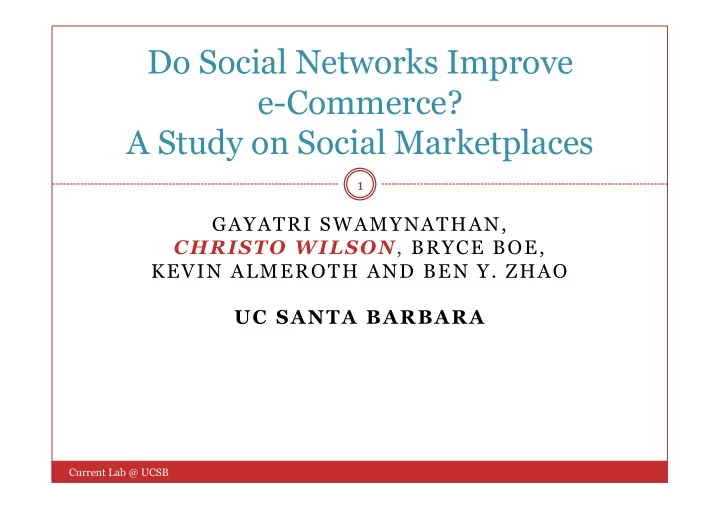

Do Social Networks Improve e-Commerce? A Study on Social Marketplaces 1 GAYATRI SWAMYNATHAN, CHRISTO WILSON , BRYCE BOE, KEVIN ALMEROTH AND BEN Y. ZHAO UC SANTA BARBARA Current Lab @ UCSB
Leveraging Online Social Networks 2 Online communities in the Web 2.0 era Facebook – ~90 million users Myspace – ~110 million users Orkut – ~60 million users Question: can friends-of-friends networks be leveraged outside social networks? Examples Internet Search Spam Filtering Online marketplaces…? Enhanced reputation systems Sybil Protection Current Lab @ UCSB
What’s Wrong With Online Marketplaces? 3 Man arrested in huge eBay fraud – MSNBC 2003 http://www.msnbc.msn.com/id/3078461/ eBay urged to tackle fraud better – BBC 2006 http://news.bbc.co.uk/1/hi/uk/4749806.stm Fraud abroad remains 'uphill battle' for eBay – CNET 2008 http://news.cnet.com/Fraud-abroad-remains-uphill-battle-for-eBay/2100-7348_3-6233893.html Tacoma woman’s house emptied after Craigslist hoax – The Seattle Times 2007 http://seattletimes.nwsource.com/html/localnews/2003652872_webhouse05m.html Escrow fraud ruining Craigslist? – ZDNet 2008 http://blogs.zdnet.com/threatchaos/?p=519 Bottom Line – Online markets plagued by fraud Feedback-based reputation systems ineffective Current Lab @ UCSB
Social Marketplaces and Overstock.com 4 Online marketplaces that incorporate social networks Hypothesis: transactions with social friends will have higher satisfaction. Are people actually using this capability? Measure transaction volume vs. path length Do social networks actually improve satisfaction? Measure satisfaction vs. path length Overstock Auctions Started in 2004 Similar to eBay Buyers leave feedback after each transaction Incorporates social components Comment and leave ratings on friend’s profiles Message boards “How am I connected?” button Current Lab @ UCSB
Methodology 5 Analyze overall network structure of Overstock Connectivity of all 431,705 users provided by Overstock Two networks : “Personal” – connecting friends “Business” – automatically connects users who transact Correlating structure with transactions Two questions: 1. What correlates transactions: Business or Social connectivity? 2. What is the impact of path length on transaction satisfaction? Crawled transaction history of ~10,000 users ~18,000 total transactions Overall feedback for each user Feedback for individual transactions Current Lab @ UCSB
Do Social Networks Improve e-Commerce? Outline 6 1. Connectivity graph analysis 2. What correlates transactions? Social vs. Business path lengths 3. Impact of path lengths on transaction satisfaction Current Lab @ UCSB
Connectivity Graph Analysis 7 Business Network Social Network Total Nodes 398,989 85,200 Total Links 1,926,553 1,895,100 Avg. Node Degree 4.82 22.24 Social 52,484 Business network network 346,505 nodes nodes 32,716 nodes (80%) (12%) (8%) 82% of users have < 1% overlap Current Lab @ UCSB
Connectivity is Heterogeneous 8 50% of users have Business network less than 10 friends has lesser degree and/or transaction overall. partners. Current Lab @ UCSB
Do Social Networks Improve e-Commerce? Outline 9 1. Connectivity graph analysis 2. What correlates transactions? Social vs. Business path lengths 3. Impact of path lengths on transaction satisfaction Current Lab @ UCSB
Transaction Volume vs. Path Length 10 Question: is there a correlation between social distance and buying decisions? Compare transaction volume to network path length For each transaction, compute hops between buyer and seller Business network – Connectivity is almost guaranteed For partners with multiple transactions, path length = 1 Otherwise, remove 1-hop edge and calculate distance Social network – Connectivity is NOT guaranteed! Not all users are present in the Social Network Current Lab @ UCSB
Observations on Transaction Volume 11 Volume vs. path lengths for 17,376 transactions At most, 20% of transactions Most transactions occur 20% of transactions can be accounted for on the between close Business occur between Social network. network neighbors. repeat buyers. Social network is smaller; is underutilized Almost no for making transaction decisions. transactions occur between friends. Current Lab @ UCSB
Do Social Networks Improve e-Commerce? Outline 12 1. Connectivity graph analysis 2. What correlates transactions? Social vs. Business path lengths 3. Impact of path lengths on transaction satisfaction Current Lab @ UCSB
Impact of Path Lengths on Satisfaction 13 Question: does social distance influence transaction satisfaction? o Transaction success percentage vs. path lengths for 17,376 transactions Example transactions: Seller Buyer Transaction ID Date Rating (-2 to +2) A B 123 2/19/2005 +2 A B 234 12/17/2004 +2 A C 345 12/15/2004 0 B D 456 12/2/2004 -1 Satisfied = [+1, +2] Current Lab @ UCSB
Observations on Personal Network 14 Near 100% 90% average satisfaction satisfaction rate for distances <= 5. Friendship is a choice! between friends. Bad sellers/fraudsters are naturally excluded from Social network. Chain of satisfaction holds at long social distances. Current Lab @ UCSB
Observations on Business Network 15 Near 100% satisfaction rate for Business connections are automatic! repeat buyers. Business networks includes all transaction Close to 0% satisfaction partners ever. This includes partners who you at larger distances! were unsatisfied with! Chain of satisfaction does not hold at long distances. Current Lab @ UCSB
Conclusions 16 Social links underutilized for making transaction decisions Most users do not participate in the social marketplace 8% of users are purely social 80% users not present in the Social network Those who do separate business from friends Very few transactions between friends Little overlap of between Social and Business networks Room for growth! Current Lab @ UCSB
Conclusions, cont. 17 Social networks increase user satisfaction Success rates at long distances are higher on Social network Social linkage is a choice, cheaters are quickly excluded Fraudsters necessarily must use many fake accounts These accounts rarely become well connected in Social network Current Lab @ UCSB
Conclusions, cont. 18 Social networks are an excellent way to avoid bad sellers User education is needed Get more people involved socially Encourage businesses to interact socially Better advertising, more features for existing services Ebay: Favorite sellers and Neighborhoods Amazon Profiles Facebook Marketplace Current Lab @ UCSB
Questions? 19 Thanks for Listening! Current Lab @ UCSB
Recommend
More recommend